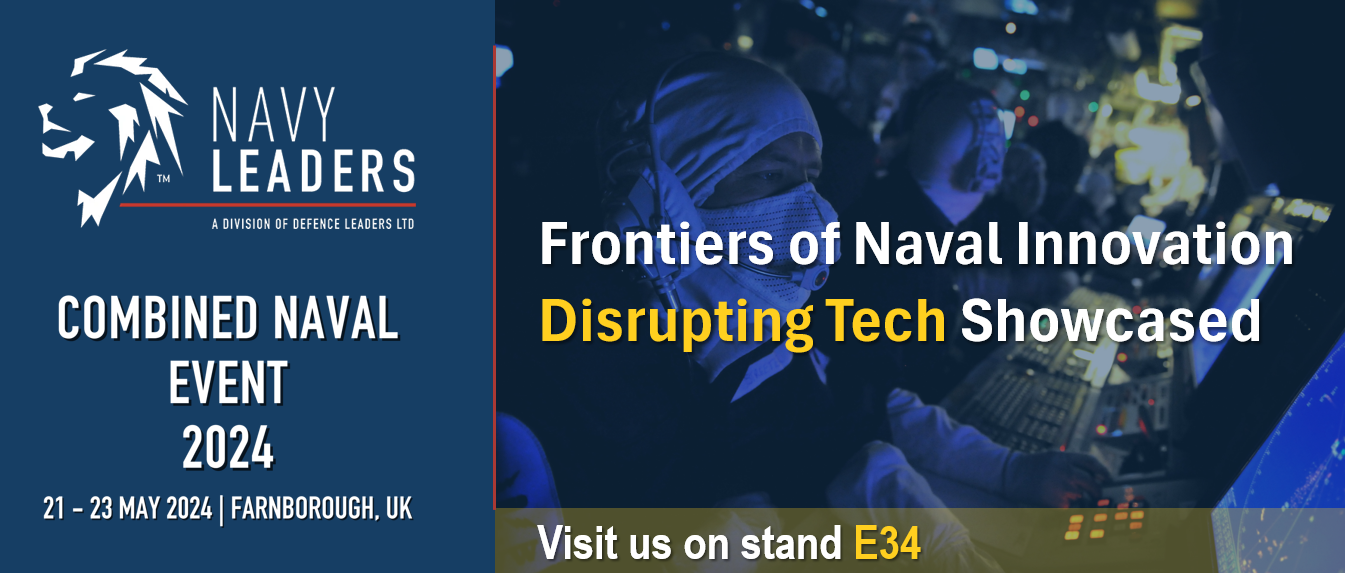
The Evolution and Crucial Role of Specialised Industrial Computing Enhancing Naval Defence Innovations
In an era defined and increasingly disrupted by technological advancements, navies around the world are leveraging electronics, specialised computing, artificial intelligence (AI) and Smart Edge IoT data to bolster their defence capabilities.
Naval warfare has undergone a profound transformation in recent decades. Transitioning from traditional confrontations to a realm where information dominance and network-centric operations reign supreme. This paradigm shift has necessitated a corresponding evolution in the computational infrastructure that underpins naval operations.
Gone are the days of rudimentary systems; today’s naval vessels are equipped with sophisticated arrays of sensors, communication devices, and weaponry, all seamlessly integrated and orchestrated by advanced and specialised industrial computers and servers running sophisticated AI-based decision support.
In this blog post, we delve into the advancements and importance of specialised industrial technologies in several different applications leading up to the Navy Leaders 2024 Combined Naval Event at the Farnborough International Exhibition Centre on 21-23 May 2024. Here, we’ll showcase a selection of advanced computing and complex integrated systems on Stand E34.
The Evolution of Ruggedised Industrial Naval Computers & Servers
One of the key advancements driving naval digital transformation is the proliferation of high-performance, ruggedised computing solutions specifically designed for maritime environments. Unlike their commercial counterparts, these specialised computers are engineered to withstand the harsh conditions prevalent at sea, including extreme temperatures, moisture, vibration, and electromagnetic interference. This ruggedisation is essential for ensuring the reliability and resilience of critical systems in the unforgiving maritime environment.
High Performance Computing
The demands of modern naval warfare require much more than just durability. They necessitate unparalleled computational power and versatility.
From real-time situational awareness to autonomous decision-making capabilities, naval vessels must be equipped with cutting-edge computing systems capable of processing vast amounts of data with lightning speed and precision. This is where specialised industrial computers excel, offering the computational horsepower and scalability needed to meet the demands of modern naval operations.
Artificial Intelligence & Machine Learning
Integrating AI and ML technologies has emerged as a game-changer in naval defence. These advanced algorithms enable naval vessels to analyse sensor data, predict enemy movements, optimise resource allocation, and even autonomously control unmanned systems.
However, harnessing the full potential of AI and ML in a maritime environment requires specialised computing architectures capable of handling the computational intensity and complexity for training, tuning and inferencing of these algorithms.
Auxiliary Naval Functions
In addition to combat operations, specialised industrial and embedded computers are crucial in supporting various auxiliary functions onboard naval vessels, including navigation, logistics, maintenance, and administration. From propulsion systems to environmental control, these computers are the backbone of modern naval infrastructure, ensuring the seamless operation of critical systems around the clock.
Protection from Vulnerabilities
With great technological power comes great vulnerability. The interconnected nature of modern naval systems exposes them to a wide range of cyber threats, ranging from malware and ransomware to sophisticated cyber attacks orchestrated by state actors. Protecting against these threats requires more than just robust hardware; it demands a comprehensive approach to cybersecurity encompassing encryption, authentication, intrusion detection, and incident response.
Span of Naval Applications
As we look to the future, the evolution of specialised industrial computers and complex systems in naval defence shows no signs of slowing down. With emerging technologies such as quantum computing, ultra-high-speed networking, and advanced sensor fusion on the horizon, the naval warfare landscape is poised for further transformation.
By staying at the forefront of these technological advancements and continuously adapting to the evolving threat landscape, naval forces can maintain their competitive edge and ensure security and stability at sea for years to come.
Autonomous Naval Systems
Integrating AI into naval defence extends beyond decision support to autonomous systems. Unmanned surface vessels (USVs) and unmanned underwater vehicles (UUVs) equipped with AI algorithms are increasingly being deployed for a wide range of missions, including reconnaissance, mine countermeasures, maritime security patrols as well as targeted weaponised delivery.
These cost-effective autonomous platforms offer several advantages, including reduced risk to human personnel, extended operational endurance, and enhanced flexibility in executing missions in challenging environments such as contested waters or littoral zones. Such systems rely on high-density computing power in compact, lightweight, power-efficient form factors that can withstand the environmental challenges of maritime and airborne operations.
Leveraging Nvidia’s portfolio of Jetson high power System-on-Module, Captec designs and manufactures custom baseboards to combine the power of modular computing with bespoke I/O electronics for deeply embedded autonomous systems.
Drone Systems
Unmanned aerial vehicles (UAVs), commonly known as drones, continue to proliferate and evolve, revolutionising warfare and offering adversaries new means to gather intelligence, conduct reconnaissance, and even launch attacks with unprecedented precision and stealth.
So much is the advancement and disruption of drone technologies in such a short period that the significance of electronic countermeasures in navy defence applications cannot be overstated. As these drones become cheaper, more accessible and advanced, navies worldwide increasingly turn to electronic countermeasures (ECM) to defend against this evolving threat. Electronic countermeasures encompass a range of technologies designed to detect, deceive, or disrupt the electronic systems of adversaries.
In drone defence, ECM is critical in safeguarding naval assets, personnel, and strategic interests. Captec has designed and manufactured both fixed and field-deployable integrated systems for several leading Primes offering solutions in this application space.
Naval Cybersecurity
Cybersecurity emerges as a critical consideration as navies become more reliant on interconnected electronic systems and network-centric warfare concepts. The proliferation of computing devices and the interconnectivity of naval assets create vulnerabilities that adversaries may exploit to compromise mission-critical systems or disrupt operations.
Therefore, robust cybersecurity measures, including encryption protocols, intrusion detection systems, and secure communication networks, are essential to safeguarding naval assets against cyber threats and ensuring the integrity and availability of critical data and command-and-control infrastructure. Captec’s embedded appliance platforms and highly secure encrypted servers based on proven and certified Viasat technology provide ruggedised systems designed to operate in naval applications.
Training & Simulation
Electronics, computing, and AI also significantly enhance training and simulation capabilities within naval forces. Advanced simulators equipped with AI-driven virtual adversaries enable realistic training scenarios for naval personnel, allowing them to hone their tactical skills and decision-making abilities in simulated environments that mirror real-world complexities. AI-based training systems can analyse performance metrics and provide personalised feedback to individual trainees, facilitating continuous improvement and readiness across the naval force.
Captec’s quadbox servers integrate four independent high-power CPUs with four GPUs for high-end simulation systems Image Generation. Used extensively in Full Flight simulations, these systems are ideally suited for various naval training & simulation applications.
Enhanced Situational Awareness
One of the paramount objectives of any navy is to maintain superior situational awareness across vast maritime domains. Electronics play a pivotal role in achieving this goal by deploying radar systems, sonar arrays, and surveillance cameras. These systems enable naval forces to detect, track, and identify potential threats ranging from enemy vessels to underwater mines.
Advancements in specialised computing have facilitated the integration of data from various sensors, providing commanders with a comprehensive picture of the operational environment in real time. Captec provides engineering design and integration capabilities for complex integrated systems, combining high-density computing with sub-systems and specialised electronics payloads in bespoke 19” rack systems. Engineered to operate reliably under challenging conditions and meet the various certification standards required for naval deployment.
Rapid Decision-Making Support
In naval warfare’s dynamic and often unpredictable realm, the ability to make informed decisions swiftly can mean the difference between success and failure. Here, IoT, edge computing technologies and AI algorithms play a vital role. By analysing vast amounts of IoT data collected from edge sensors, satellites, and reconnaissance aircraft, AI-powered systems can identify patterns, predict enemy behaviour, and recommend optimal courses of action to naval commanders.
This capability enables faster response times and enhances the effectiveness of naval operations across diverse scenarios, from anti-submarine warfare to maritime patrol. Captec provides end-to-end design engineering, UK and Canadian manufacturing and integration to provide bespoke platforms for naval primes with full-stack applications solutions seeking a specialised hardware partner.
Leveraging Advanced Technologies for Enhanced Naval Defence Capabilities
Integrating electronics, specialised industrial computing, and artificial intelligence into complex integrated systems and sub-systems has become indispensable to modern naval defence operations.
From enhancing situational awareness and enabling rapid decision-making to facilitating the deployment of autonomous systems and bolstering cybersecurity, these technologies offer a multitude of benefits that enhance the effectiveness and efficiency of naval forces worldwide. As the naval landscape continues to evolve, embracing and harnessing the power of these technologies will be crucial for maintaining maritime superiority and safeguarding national interests on the high seas.
To learn more about what Captec offers and how we can help expedite bringing solutions to market, visit us on Stand E34 at this year’s Navy Leaders Event. Register for the event, or book an appointment to speak with us using our event calendar.



